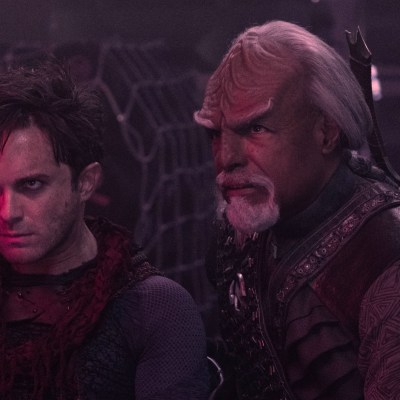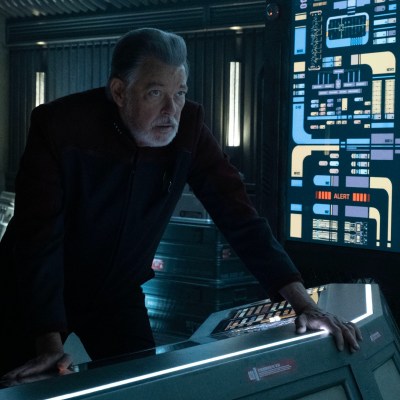Star Trek: Picard Season 3 Episode 3 Review – Seventeen Seconds
An action-packed Star Trek: Picard gives us the emotional reunion we’ve been waiting for (and a whole lot more)

This Star Trek: Picard review contains spoilers.
Star Trek: Picard Season 3 Episode 3
Star Trek: Picard season 3’s third episode is its best outing yet, an action-packed, emotional adventure that feels determined to show us everything that this show can do and be, all in a single hour. And in the aftermath of an episode where it felt like almost nothing happened (save for the revelation that Jack Crusher is Jean-Luc Picard’s son, a twist which most of us probably guessed well before the show confirmed it), “Seventeen Seconds” lands like a thunderclap, fully determined from its opening moments to make up for the time that the Star Trek series’ first two installments wasted on boring things like plot exposition and setup.
Oh, you wanted Beverly and Jean-Luc to finally have that heart-to-heart that’s been several decades in the making? That happens. Maybe a better demonstration of that powerful portal technology and an explanation of how Raffi’s story ties into that of Star Trek: The Next Generation crew? Done! How about the inclusion of an enemy from Deep Space Nine? Epic battle sequences with genuine stakes? Heartfelt speeches about fatherhood? Picard and Riker at odds in a really awkward “mom and dad are fighting” kind of way? Worf getting the chance to be both fantastically badass and incredibly zen? Check, check, check, and double-check.
But despite the expertly crafted action sequences and frequently arresting visuals—truly everything about this episode looks stunning—this is an hour whose best and most impactful moments are emotional ones. From a brief flashback scene in which Picard and Riker celebrate the birth of Will’s son to the present-day moment in which Jean-Luc confronts Beverly about the child he never knew he had, this is a story that wrestles with themes of fatherhood, love, and legacy. And in case anyone was curious: Patrick Stewart and Gates McFadden absolutely still have it.
The pair only share one real scene with any dialogue and it’s an absolute knock-out, an extended sequence that fills in some gaps about the pair’s apparent on-again, off-again romantic history (they went on shore leave together!) and offers Beverly a chance to explain why she kept Jean-Luc in the dark all these years. I mean, to be fair—she makes some valid points. PIcard’s one of the most famous people in Starfleet, heck, probably in most of the universe. We’ve seen him get attacked, kidnapped, and blackmailed over the years, and he constantly put himself in a variety of life-threatening situations on purpose. (The show keeps encouraging us to forget this, but the man is also basically a literal robot now.)
Picard is undoubtedly a great man, and a hell of a role model, but he’s certainly not always safe. The odds of something awful happening to someone in his immediate vicinity are stupidly high. I mean, he’s known Jack for like six hours and the kid’s already had a near-death experience. (I kid—it’s likely Jack’s own fault he’s being hunted by space pirates, but the optics there certainly aren’t great.)
All that said, Picard isn’t exactly wrong either, which is what makes this scene so compelling to watch. His anger at being left in the dark—and his hurt at being essentially ghosted by someone he loved—is palpable. (And it really isn’t fair that Beverly condemned him for a choice she never gave him the chance to make.) Picard deserved a chance to become the man that becoming a father would have made him, and both he and Jack deserved to have a genuine relationship that grew and changed as they both did, not one colored by what Beverley chose to tell her son about her time on the Enterprise or the stories he read about all the things the famous Admiral was doing that weren’t being his father.
But, as they say, the best conflicts come when both sides are sort of right—and both Stewart and McFadden are masters at conveying emotion well beyond the simple words on the page. Their complex facial expressions, and the sense that every sentence they exchange has the weight of decades of history behind it…well, despite how enjoyable the rest of the episode is, is there any doubt it’s this moment we’re all going to remember?
Unfortunately, despite having the mystery of his paternity cleared up, as a character, Jack still kind of sucks. Yes, “Seventeen Seconds” gives him a few opportunities to do good for the various crew members who are risking their lives to keep him safe, and he does manage to figure out how Vadic’s trailing the ship, but his utterly determined dislike of his father is already tiresome. (Perhaps this attitude would be justified if Picard had abandoned him, but since he was the only member of their little family who didn’t know his role in it, it seems wildly unfair to be angry at him for it.) The fact that we also know so little about Jack’s past, or what it is about him that makes him so attractive to Vadic and the crew of her murder ship, is also wearing thin. The amount of work she—or someone, at any rate—has put into capturing this kid is fairly staggering, well above and beyond what anyone might expect in conjunction with a simple smuggler or rogue medic. It’d be nice to know why, if only to feel invested in whether she actually succeeds in her mission or not.
On the plus side, the addition of Worf was apparently all we needed to make Raffi’s arc worth watching. The revelation that the famous Klingon was her secretive spy handler makes a ton of sense (although I do have serious questions about how Worf ended up in that job), and the addition of shapeshifting Changelings and portal technology has finally connected her side quest to the season’s main plot. Michael Dorn has somehow become even more charming (and attractive, let’s be real) in the years since we last saw him onscreen in Deep Space Nine, and Worf’s newfound desire to “work on himself” is the sort of unintentional comedy this character has always excelled at. Maybe Raffi has always needed a straight man to balance her messiness, I don’t know, but “Seventeen Seconds” is as likable and interesting as this character’s been since Picard season 1.
And while the episode may end with a cliffhanger—the U.S.S. Titan, trapped in a gravity well, is literally circling the drain of its own death—Picard itself has strangely never felt more confident and clear-eyed as a narrative. Here’s to seeing where this final journey takes us, now that it at least feels properly under way.


